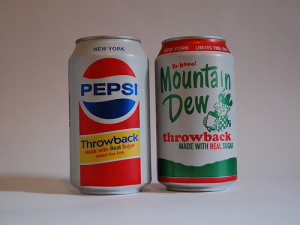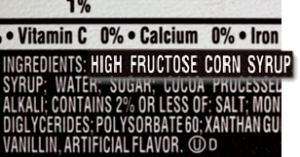Recently a friend and colleague of mine lost a noticeable amount of weight and I asked him about it. He told me that he had recently switched over from regular soda to a so-called “throwback” soda that is, as he put it “healthier because it has real sugar instead of high-fructose corn syrup.” He further explained  that he has lost 12 pounds since he made the switch and that he feels a lot better now. I must admit I was pretty impressed by the fact that he lost weight by changing his corn-syrupy ways.
that he has lost 12 pounds since he made the switch and that he feels a lot better now. I must admit I was pretty impressed by the fact that he lost weight by changing his corn-syrupy ways.
Corn syrup is believed by many to be very unhealthy and is often accused of being a major player in the rise in obesity that has occurred since the 1970s. Of course I am skeptical of the claims made about corn syrup because, at least as far as weight management goes, the evidence still indicates that calorie balance (what you consume compared to what you burn) is of the greatest importance. This colleague of mine, however swore by his plan and further there was obvious visible evidence that he had lost weight…I could see it with my own eyes.
Based on that conversation and the general fact that this colleague is a smart guy whose judgment I am inclined to trust, I found myself believing that there may be some truth to the corn syrup claims. The next day, however, I ran into him at the gym. We started talking and he told me that when he decided to give up corn-syrup he also had decided to start working out and that he was now also using an app on his phone that helped him track his Caloric intake so he can avoid eating too much. I asked him if he thought it was possible that the exercise and Calorie restriction might be why he’s lost weight and feels so much better rather than just the corn-syrup. He said it was possible but that he didn’t think so, he felt extremely confident that it was in fact the corn syrup.
Whether corn-syrup is bad for us is debatable (about which more in a bit), however it is very important to remember why, when wading through information on this or any scientific topic, testimonial or anecdotal evidence has very little value as scientific evidence. Anecdotes like the one offered to me by my colleague (who is very astute and intelligent) often seem convincing. However, particularly with health matters, it is easy to misalign cause and effect. A subtle yet pervasive reason for this is something called the Fallacy of False Cause, an oft made mistake in which we assume that two events are causally connected.
 If, for example, I observed that every morning, just before sunrise, a rooster crowed then concluded that it was the rooster crowing that caused the sun to rise, I would be committing this fallacy. Okay so this example seems a bit far-fetched but think about my friend who, while he gave up corn-syrup, also reduced his Caloric intake, started exercising, and lost weight, then concluded that his weight loss was attributable to the lack of corn syrup rather than all of his hard work and discipline. This despite the fact that research has proven time and again that eating less and exercising more is the most effective path to healthy weight loss.
If, for example, I observed that every morning, just before sunrise, a rooster crowed then concluded that it was the rooster crowing that caused the sun to rise, I would be committing this fallacy. Okay so this example seems a bit far-fetched but think about my friend who, while he gave up corn-syrup, also reduced his Caloric intake, started exercising, and lost weight, then concluded that his weight loss was attributable to the lack of corn syrup rather than all of his hard work and discipline. This despite the fact that research has proven time and again that eating less and exercising more is the most effective path to healthy weight loss.
High-fructose corn-syrup (HFCS) was developed in the 1960s and has since been increasingly used in the food supply as a sweetener because, in the U.S., it is significantly cheaper than cane or beet sugar. HFCS is not meaningfully different in composition or metabolism from other fructose-glucose sweeteners like sucrose (otherwise known as refined sugar or just sugar) but it does account for roughly 10% of the Calories we consume daily in the U.S. and for roughly 42% of added sweeteners in the food supply, which is quite significant.
There has been a substantial amount of research on the topic of HFCS. In a 2004 review, Bray and Colleagues point out that the consumption of HFCS has increased substantially since its introduction and conclude that this increase may play a role in the rising levels of obesity. While this is a well-written review with sound conclusions it’s important to note that the authors blame an increase in HFCS consumption for the rise in obesity. This does not provide any damning evidence against corn-syrup as a food; it merely shows that we are consuming too much of it. Further, in a 2007 review by Forshee and colleagues the authors point out that the ratio of fructose to glucose in the U.S. food supply has not appreciably changed since corn syrup was originally introduced, they further conclude that based on the available evidence, HFCS does not contribute to weight gain and obesity any differently than other nutrients do. These conclusions are supported as well in separate reviews by White, and by Moeller and colleagues.
Based on the available evidence it is clear that HFCS can indeed lead to caloric imbalance when we consume too much of it. However the same could be said of “natural” sugar. There is not a lot of doubt that HFCS is a pervasive ingredient in many processed foods, however to assume that it is the cause of obesity because it is inherently hazardous, rather than factoring it in to the big picture is a more subtle, and perhaps more disruptive example of the fallacy of false cause.
